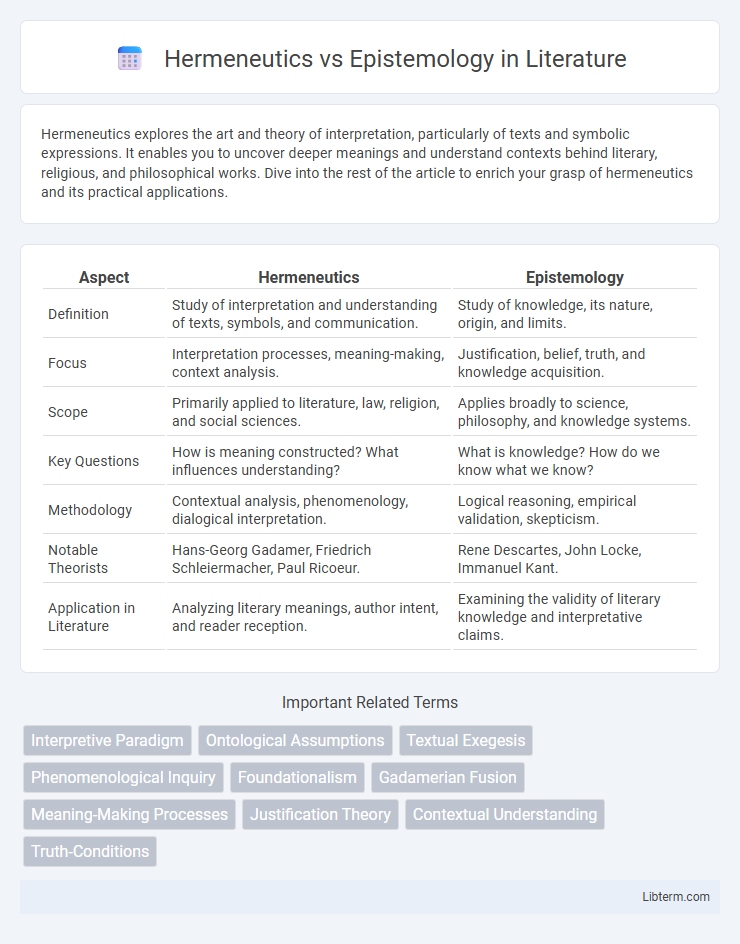Hermeneutics explores the art and theory of interpretation, particularly of texts and symbolic expressions. It enables you to uncover deeper meanings and understand contexts behind literary, religious, and philosophical works. Dive into the rest of the article to enrich your grasp of hermeneutics and its practical applications.
Table of Comparison
| Aspect | Hermeneutics | Epistemology |
|---|---|---|
| Definition | Study of interpretation and understanding of texts, symbols, and communication. | Study of knowledge, its nature, origin, and limits. |
| Focus | Interpretation processes, meaning-making, context analysis. | Justification, belief, truth, and knowledge acquisition. |
| Scope | Primarily applied to literature, law, religion, and social sciences. | Applies broadly to science, philosophy, and knowledge systems. |
| Key Questions | How is meaning constructed? What influences understanding? | What is knowledge? How do we know what we know? |
| Methodology | Contextual analysis, phenomenology, dialogical interpretation. | Logical reasoning, empirical validation, skepticism. |
| Notable Theorists | Hans-Georg Gadamer, Friedrich Schleiermacher, Paul Ricoeur. | Rene Descartes, John Locke, Immanuel Kant. |
| Application in Literature | Analyzing literary meanings, author intent, and reader reception. | Examining the validity of literary knowledge and interpretative claims. |
Understanding Hermeneutics: Definition and Foundations
Hermeneutics is the theory and methodology of interpretation, especially the interpretation of texts, language, and symbolic expressions, rooted in the works of philosophers like Friedrich Schleiermacher and Hans-Georg Gadamer. It emphasizes the dynamic interaction between the interpreter, the text, and the historical context, aiming to uncover deeper meanings beyond surface-level understanding. Epistemology, by contrast, studies the nature and scope of knowledge, focusing on what it means to know, how knowledge is acquired, and the justification of belief.
Epistemology Explained: Nature and Scope
Epistemology explores the nature, sources, and limits of knowledge, examining how beliefs are justified and what constitutes true understanding. It investigates cognitive processes such as perception, reasoning, and memory to determine the validity and scope of knowledge claims. Unlike hermeneutics, which focuses on interpretation and meaning, epistemology centers on criteria and methods for acquiring objective, reliable knowledge.
Core Differences Between Hermeneutics and Epistemology
Hermeneutics centers on the interpretation and understanding of texts, emphasizing meaning within cultural and historical contexts, while epistemology investigates the nature, scope, and justification of knowledge itself. Hermeneutics relies on subjective interpretation informed by hermeneutic principles, whereas epistemology seeks objective criteria for belief validation and truth. The core difference lies in hermeneutics addressing how we interpret meaning, with epistemology focused on how we know what we know.
Historical Development of Hermeneutics
Hermeneutics originated as a method for interpreting sacred texts, evolving through the works of Friedrich Schleiermacher and Wilhelm Dilthey who expanded its scope to include understanding human experience and historical context. The 20th century brought further development with Hans-Georg Gadamer emphasizing the fusion of horizons between the interpreter and the text, shifting hermeneutics toward a philosophical discipline. Unlike epistemology, which addresses the nature and scope of knowledge, hermeneutics focuses specifically on interpretive processes shaped by language, history, and culture.
Key Figures in Epistemology
Key figures in epistemology include Rene Descartes, who pioneered the method of doubt to establish certainty; John Locke, known for his theory of empiricism emphasizing sensory experience as the source of knowledge; and Immanuel Kant, who synthesized rationalism and empiricism by proposing that knowledge arises from the interaction of innate concepts and experience. Contemporary epistemologists like Edmund Gettier challenge traditional definitions of knowledge with counterexamples, reshaping the field's understanding. These thinkers critically influence epistemology's exploration of knowledge, belief, and justification, distinct from hermeneutics' focus on interpretation and meaning.
Methods of Interpretation in Hermeneutics
Hermeneutics relies on interpretative methods such as the hermeneutic circle, where understanding is achieved through iterative analysis of parts and the whole text, emphasizing context and authorial intent. Techniques like dialectical reasoning and phenomenological analysis explore underlying meanings beyond literal expressions, distinguishing hermeneutics from epistemological approaches that prioritize knowledge validation and justification. Hermeneutics prioritizes subjective interpretation and meaning construction over empirical evidence typically examined in epistemology.
Theories of Knowledge in Epistemology
Epistemology studies theories of knowledge, focusing on how knowledge is acquired, justified, and validated, distinguishing between a priori and a posteriori knowledge. Hermeneutics emphasizes interpretation, particularly the understanding of texts, language, and meaning within historical and cultural contexts. Epistemological theories like foundationalism, coherentism, and reliabilism explore cognitive processes and sources of knowledge, contrasting with hermeneutics' focus on the interpretive frameworks shaping human understanding.
Practical Applications: Hermeneutics in the Humanities
Hermeneutics plays a crucial role in the humanities by enabling deeper interpretation of texts, art, and historical artifacts, facilitating an understanding of cultural and historical contexts. It aids scholars in uncovering meanings embedded in language, symbolism, and narrative structures, which is essential for disciplines like literature, theology, and anthropology. Unlike epistemology, which focuses on the nature and scope of knowledge itself, hermeneutics emphasizes practical methodologies for interpreting and engaging with human expressions and experiences.
Epistemological Approaches in Science and Philosophy
Epistemology investigates the nature, sources, and limits of knowledge, playing a crucial role in shaping scientific methodologies and philosophical inquiry. Scientific epistemology emphasizes empirical evidence, reproducibility, and falsifiability as means to validate knowledge claims, contrasting with hermeneutics, which focuses on interpretive understanding of texts and meanings. Philosophical epistemological approaches address questions about justification, belief, and truth, informing debates on how knowledge is acquired and validated across disciplines.
Integrating Hermeneutic and Epistemological Perspectives
Integrating hermeneutic and epistemological perspectives enriches the understanding of knowledge by combining interpretative methods with theories of justification and truth. Hermeneutics emphasizes context, meaning, and the subjective experience of understanding, while epistemology focuses on the conditions and validity of knowledge claims. This integration fosters a comprehensive approach that acknowledges the dynamic interplay between interpretation and knowledge validation, enhancing both qualitative insights and epistemic rigor.
Hermeneutics Infographic

 libterm.com
libterm.com